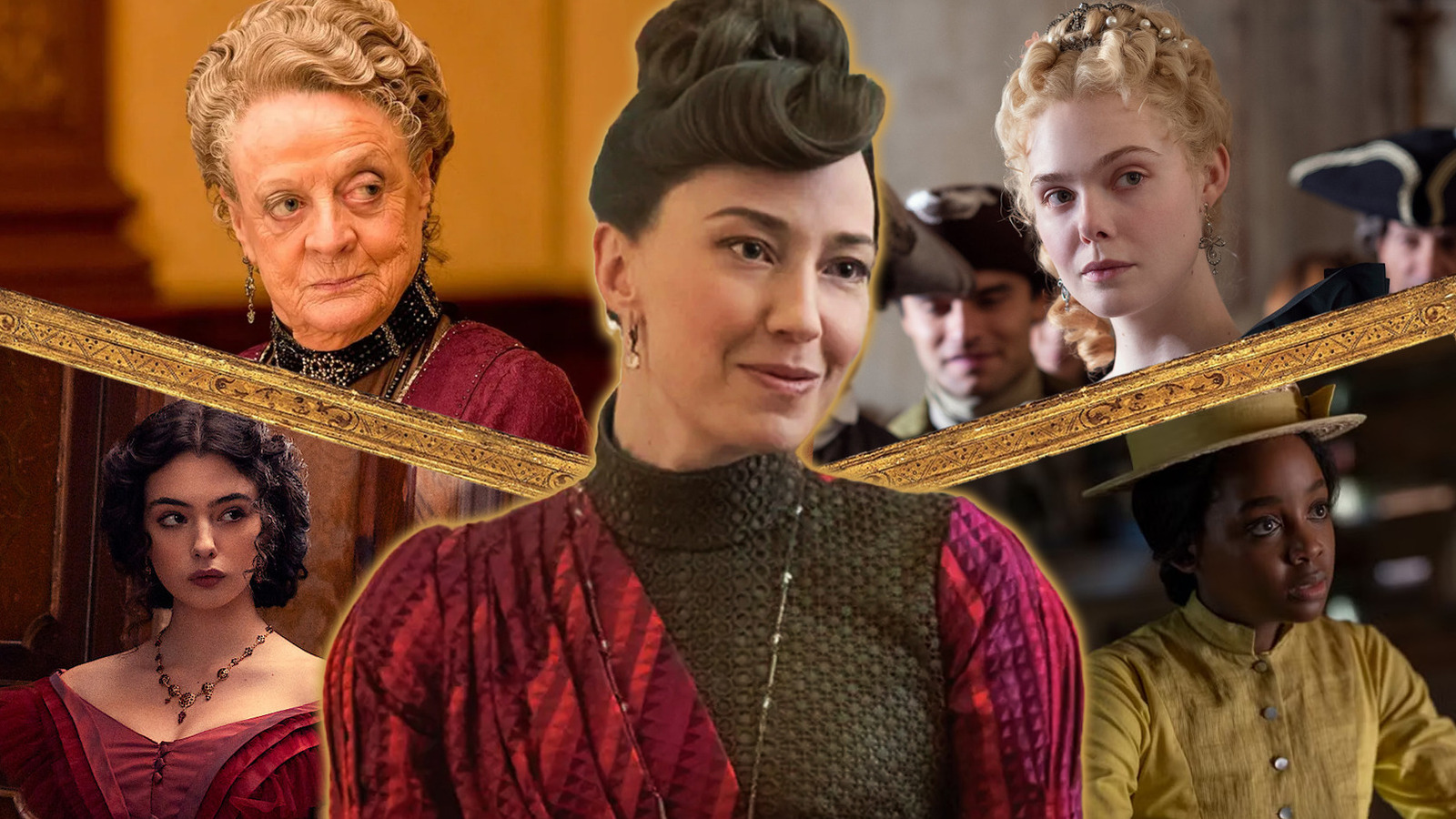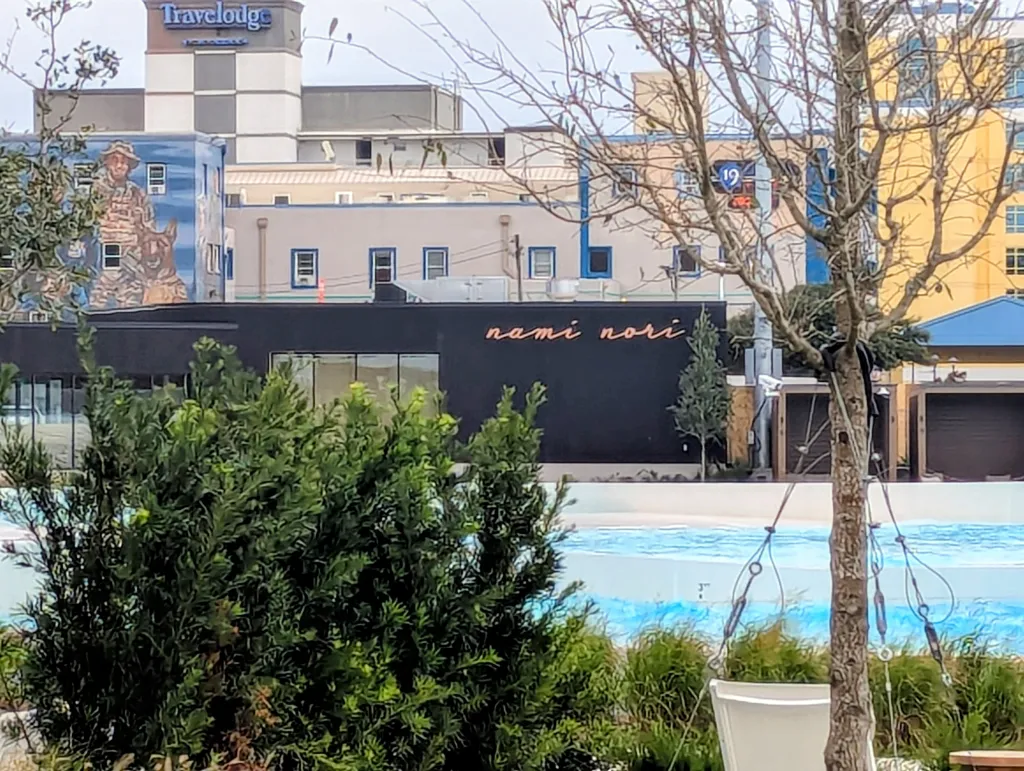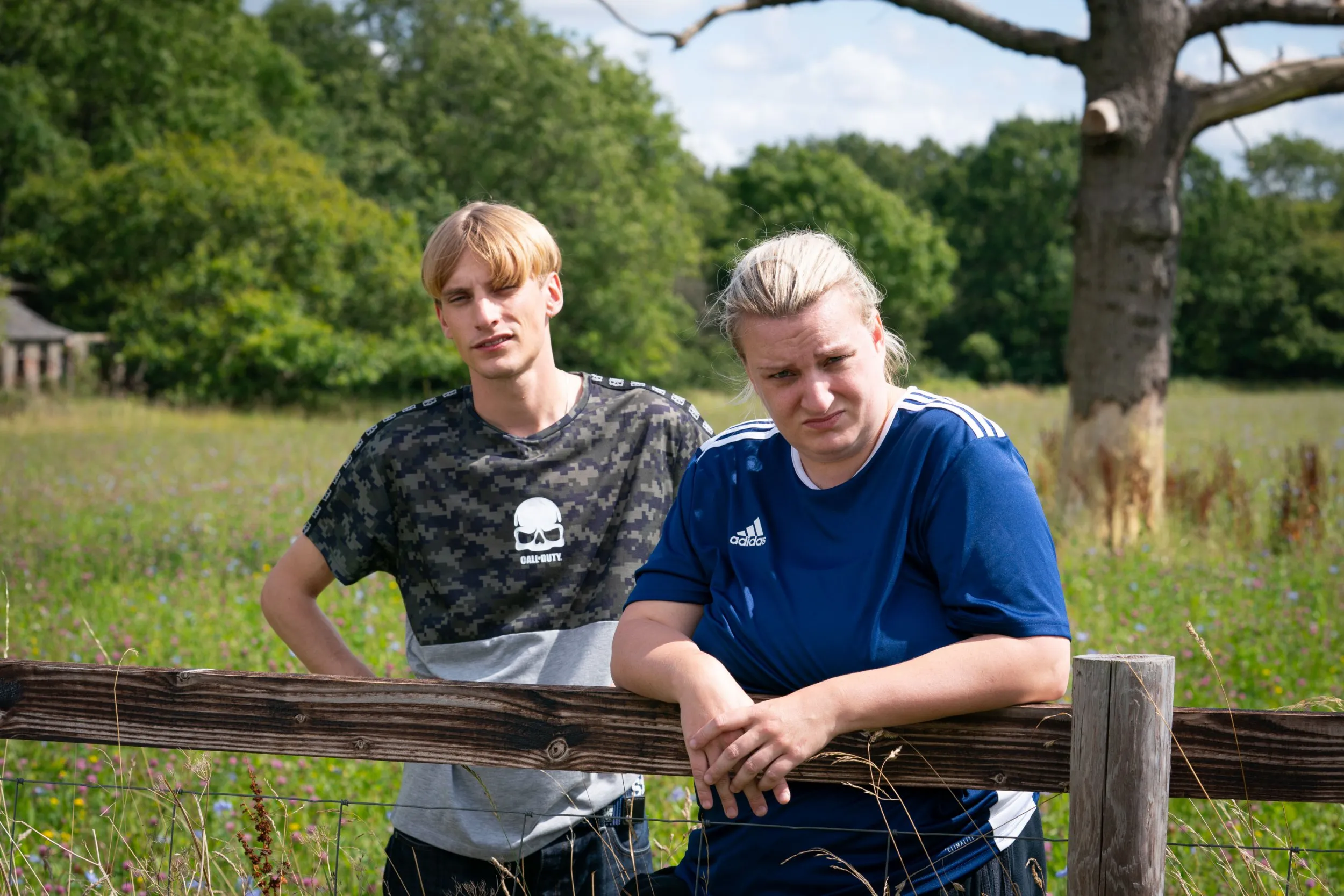Copyright /FILM

Nothing succeeds like excess, as the great Oscar Wilde once wrote. "The Gilded Age" speaks to this aphorism, as showrunner Julian Fellowes brings to life a period in American history where opulence was the order of the day, especially in New York City. It revolves around two families who live across the street from one another: one an old-money family with a list of esteemed ancestors a mile long, the other led by a robber baron (Morgan Spector) and his ambitious wife (Carrie Coon), who are chomping at the bit to be accepted into the highest echelons of elite society. Their evolving positions in a New York that is changing with each passing day provide constant entertainment, as those in their orbit are caught up in no end of high drama, as evinced by the infamous opera wars. (Yes, that was a real thing, even if Mrs. Russell wasn't an actual historical figure.) "The Gilded Age" was recently renewed for a fourth season by HBO, but if you're looking for something else to watch while you're waiting, here are a handful of other glittering period dramas to feast on in the mean time. To be honest, if you're watching "The Gilded Age," there's a very good chance that you've already seen "Downton Abbey," but it's too essential to the period drama genre to ignore completely. Beginning with the sinking of the Titanic in the very first episode, "Downton Abbey" follows an aristocratic family and their servants through the massive changes that hit England during the next decade and a half. When the Grantham estate loses its two heirs aboard the Titanic, third cousin Matthew Crawley (Dan Stevens) — a lawyer, to the bemusement of his newfound relations — is brought into the fold so that he can be groomed to take over the earldom. But between World War I, several romances, and a handful of tragic deaths, the Crawleys have more to deal with than the prospect of a middle-class solicitor inheriting everything. The frothy costume drama was a runaway hit, running for six seasons (some better than others) and earning three sequel films, the most recent of which premiered in September 2025. After the success of "Downton Abbey" (but before "The Gilded Age"), audiences were clamoring for more Julian Fellowes period dramas. He happily acquiesced, releasing "Belgravia" in 2020. Although it struggled to find an audience and only lasted for two seasons (well, technically one, followed by a spinoff series "Belgravia: The Next Chapter"), it has much of the panache and charm that made his other shows such a hit. Set in London in 1841, it revolves around two wealthy families — the Trenchards and the Ballasis– whose decades-old secrets that date back to the Napoleonic era are now in danger of being exposed. It didn't catch on with viewers at the time, but we find it worth a watch. The extravagant sets and costumes alone are worth the price of admission. And we're never mad about seeing more of Tamsin Grieg and Harriet Walter, who play the two family matriarchs with aplomb. Move over, Mr. and Mrs. Russell, there's a new power couple in town. "The Great" is a cheeky, iconoclastic comedy series revolving around Catherine the Great (Elle Fanning in a career best role) when she first moves to Russia, full of optimism about the change that she will be able to enact in her adopted country. But her hopes are quickly tempered when she is introduced to the frequently barbaric, always backwards Russian court, particularly the man she's marrying, Emperor Peter III (a delightfully profane Nicholas Hoult). If Catherine has any chance of bringing her Enlightenment ideals to Russia, she'll have to learn to play their game. Funnier than it has any right to be, "The Great" succeeds on the strength of its perverse writing and the impeccable chemistry between Fanning and Hoult. Their relationship evolves in unexpected ways, somehow culminating in a strange sort of love. "The Great" ran for three seasons, but honestly, we would have watched half a dozen more. We only get minor glimpses of LGBTQ+ life in "The Gilded Age," largely through the trials and tribulations of Oscar van Rhijn (Blake Ritsen), whose fortune-hunting antics provide the perfect cover for his sexuality. In fact, it's only fairly recently that films and television series have even begun to acknowledge that gay people existed in the past, something that "Gentleman Jack" seeks to remedy. Based on the diaries of Anne Lister, "Gentleman Jack" stars Suranne Jones as the English landowner whose lesbian relationships defy our modern expectations of women in the 1800s. The series itself has a wry sense of humor, with Jones frequently breaking the fourth wall to directly address the audience. When Anne moves to Yorkshire to take over the running of her family estate, she falls hard for a wealthy neighbor (Ann Walker, played by Sophie Rundle), an attachment that threatens to cause trouble in a less-than-enlightened 19th-century English society. "Gentleman Jack" ran for two seasons from 2019 and 2022, earning rave reviews especially for Jones' lead performance. There's something about the earnestness of Marion (Louisa Jacobson) that reminds us of another blond heroine from humble origins who ends up hobnobbing with the rich: Denise Lovett (Joanna Vanderham) on "The Paradise." This costume drama takes place around the same time as "The Gilded Age," but in England, where it focuses on The Paradise, which is presented as one of the first English department stores. When Denise moves from Scotland to try to find a job, she ends up working in the ladies' fashion department, and her innovative ideas catch the eye of the store's owner, John Moray (Emun Elliott). She has a Donald Draper-like knack for marketing, and combined with her movie star good lucks, it's easy to see why she's such a success at The Paradise (even if her colleagues resent her for it). Part exploration of business and social history in the 1800s, part traditional period romance, "The Paradise" is an interesting and engaging romp that we wish could have stuck around on the air for several more years. Long before Harry Richardson took on the role of Larry Russell in "The Gilded Age," he was cast in one of the lead roles of "Doctor Thorne," an adaptation of Anthony Trollope's novel of the same name (and another Julian Fellowes project, so we hope you're not getting tired of that fellow yet). In it, Tom Hollander stars as the titular Doctor Thorne, who has spent many years raising his niece Mary (Stephanie Martini). She's happily in love with Frank Gresham (Harry Richardson), but there's just one problem: His family is in dire financial straits, and he needs to marry for money or risk losing his family's home. Quite a conundrum, indeed. With winning performances from the entire lead cast, "Doctor Thorne" is a delightful period drama with just the right amount of sweetness. It has shades of Charles Dickens' "Little Dorrit," but for our money, is a more streamlined and entertaining story. In "The Gilded Age," the class conflict is largely between old money and new money, where the families who have been in New York since it was New Amsterdam look down on those whose wealth has been accumulated more recently. There's a similar tension in "North and South," although it's more between country dwellers and city folk, and factory owners and their employees. In it, Margaret Hale (Daniela Denby-Ashe) and her quietly genteel parents, relocate from their parsonage in the southern English countryside to the industrial town of Milton in the north of England — which may as well be the moon, as far as she's concerned. While there, she immediately butts heads with John Thornton (Richard Armitage), a local factory owner who she sees as callous and unrefined. Will they be able to overcome their misperceptions of one another long enough to discover that they've got white hot chemistry? You'll have to watch it to find out. In "The Gilded Age," the depiction of medical care is largely relegated to fancy doctors making house calls whenever someone falls ill (well, and there's that one time that Mr. Russell is shot and has to be operated on in his living room, but that's neither here nor there). Still, at the very same time in New York City, there were hospitals working to revolutionize the art of medicine, and that's what the prematurely cancelled "The Knick" focuses on. Clive Owen stars as Dr. John Thackery, a surgeon fighting to keep mortality rates down during a time when the use of antiseptics was still in its infancy, all while managing his not insignificant drug problem. (Hey, it's 1900, you'd be hard-pressed to find a surgeon who wasn't getting high off his own supply, or so we imagine.) Gruesome, brutal, and hard to look away from (in the best way possible), "The Knick" will fill a void for a very specific viewer who is impatiently awaiting the return of both "The Gilded Age" and medical breakout hit "The Pitt." Apparently, all hope is not lost that "The Knick" might somehow be resurrected for another season! "The Gilded Age" focuses on the glitz and glamour of New York high society in the decades leading up to the turn of the century, but "The Alienist" serves as a reminder that were plenty of less elegant things going on in the city's underbelly during the same period. Set in 1896, this period drama starring Daniel Brühl, Luke Evans, and Dakota Fanning revolves around a team of investigators looking into a series of grisly murders that appear to be the work of a serial killer. Laszlo Kreizler (Brühl) operates essentially as a 19th century version of a "Criminal Minds" analyst: As a psychiatrist, he begins to study the inner workings of the mind of a child murderer, hoping that this insight will help him find the culprit. Dark, gritty, and often disturbing, "The Alienist" is about as far from the extravagent antics of "The Gilded Age" as possible while still occupying roughly the same place and time. But if you're looking for an alternate take on New York in the late 1800s, you've found it. Based on a novel series by John Galsworthy, "The Forsyte Saga" takes an intimate look at the interpersonal dynamics of the Forsyte family over the course of several decades from the 1870s through to the 1920s. It's a sprawling epic with enough intertwined characters to make Leo Tolstoy blush, as we watch the consequences of their actions take root over two generations. "The Forsyte Saga" was blessed with an excellent cast that includes Damian Lewis, Rupert Graves, Ioan Gruffudd, Amanda Root, Ben Miles, and many others. Although it covers the entire novel in just one season, it received a follow-up series that adapts Galsworthy's own sequel "To Let," which takes place nine years after the events of the original series. If you can't get enough of the scheming family drama peppered throughout "The Gilded Age," "The Forsyte Saga" is the perfect series to binge while you're waiting for the fourth season to hit the airwaves. "The Gilded Age" has George Russell as its self-made man who rises to riches and glory he could have only dreamt of, and in "Mr. Selfridge," we have Mr. Harry Selfridge himself, played by Jeremy Piven. Set at the turn of the 20th century, it follows Selfridge as he embarks on a journey to build London's first ever department store. Of course, he has a tendency to get in his own way, unnecessarily complicating matters with personal drama. But at the same time, we can't help but admire the vision and plucky resolve he demonstrates as he works to make "Selfridge & Co." a reality. Unlike many of period dramas on this list, which have characters who are loosely based on real people but are largely fictionalized (with some exceptions, like the Astors on "The Gilded Age"), "Mr. Selfridge" is built around the exploits of a real person. His was a real rags to riches story, as he went from delivering newspapers in Wisconsin and establishing Chicago's Marshall Field's department store to eventually launching his own store and becoming known to many as "the Earl of Oxford Street." "Mr. Selfridge" ran for four seasons on ITV, winning over audiences along the way. Based on a 1958 novel by Giuseppe Tomasi di Lampedusa — which was also adapted for the big screen in 1963 — "The Leopard" also features wealthy families trying to make their way in a rapidly changing society. In this case, it's the aristocratic Salina family, who are living through the chaos of the Italian unification. In Sicily, where the Salinas live, armies are marching their way across the island so that the Kingdom of Two Sicilies can brought into the fledgling country of Italy (by force, if necessary). But even in a time of major upheaval for all involved, life carries on for the Salinas. "The Leopard" has a slow and steady pace to it, so it might not be the best option if you're looking for a zippy period drama, but its rich and sumptuous production values make watching it — even on Netflix, where it's one of their most underrated series — feel like a luxury experience. When Gladys Russell (Taissa Farmiga) is shipped off to England to exchange her fortune for a title, she's a part of a larger movement of American heiresses seeking ancient English houses. This trend is more fully explored in "The Buccaneers," based on an Edith Wharton novel about a group of rowdy American girls who are sent across the ocean to find husbands. And although there is a recent adaptation that has just been renewed for a third season by Apple TV+, the miniseries version from 1995 is vastly superior. It features Mira Sorvino, Carla Gugino, Alison Elliott, and Rya Kihlstedt as the fortune hunters in question, and their romantic exploits after being set loose upon English society are an utter delight. Here, we get to see the dramatized impact of the American nouveau riche on the staid, house-rich but money-poor British aristocracy, in the form of girls who light up every room but aren't anyone's idea of a proper duchess. "The Gilded Age" takes place towards the end of the 19th century, long after slavery in the United States had drawn to a close. But with the storylines related to Peggy (Denée Benton) and in particular her father (John Douglas Thompson), who was born an enslaved person, its legacy is never as far away as it seems. "The Underground Railroad," directed by Oscar winner Barry Jenkins, was based on the novel by Colson Whitehead. It revolves around the arduous journey made by Black people from Southern plantations as they risk everything for the prospect of freedom. Starring Thuso Mbedu and Aaron Pierre as a pair of slaves who flee for Canada from Georgia, "The Underground Railroad" is spellbinding in not just its dramatic exploits, but its incorporation of magical realism into the historical narrative. It was nominated for Best Limited Series or Anthology at the Emmys, with Barry Jenkins also earning a nod for his work as director. In the days of "The Gilded Age," a young woman's reputation was to be fiercely guarded. A lifetime to build, seconds to destroy. And that's certainly the case in Netflix's Spanish language period comedy "The Lady's Companion," which revolves around professional companion Elena Bianda (Nadia de Santiago), who is hired to escort three teenage sisters over the course of the season. (She is, predictably, not the best at her job, as the eldest sister almost immediately falls pregnant.) She's there to keep the girls in line, of course, but also to help guide them towards the type of matches they should be pursuing — no easy task, considering that the oldest sister already has her eyes on a man, the middle sister is more interested in pursuing medicine than boys, and the youngest is a mere child. Filled with fourth wall-breaking humor, "The Lady's Companion" isn't the most traditional period show, but it's a delight nonetheless.



